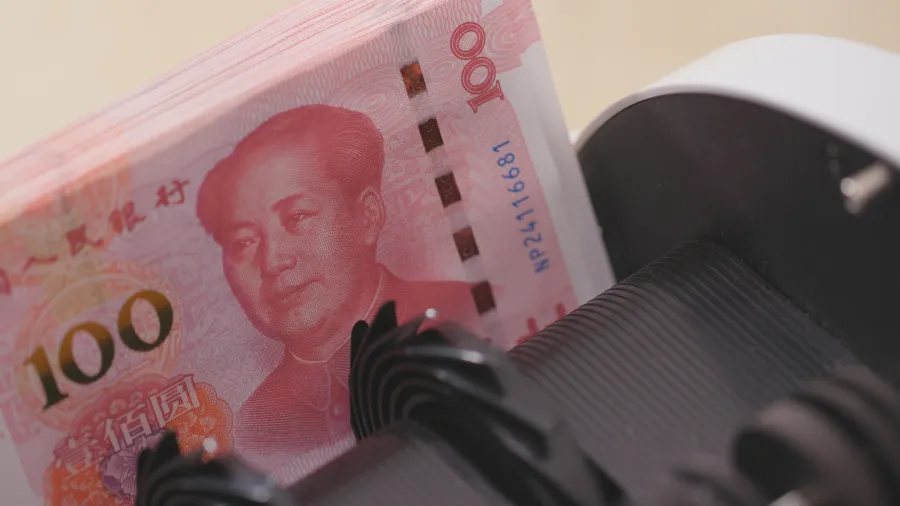
China’s payment system gets boost from renminbi rise
African SMEs get the same level of service as large companies under a more open China.
More global financial institutions are joining China’s cross-border interbank payment system amidst the renminbi’s rise as a trade currency, according to financial analysts.
"We’ve noticed a shift towards an increased use of the renminbi for payment and trade requirements," Michael von Fintel, head of Financial Institutions at Absa Corporate and Investment Banking Ltd., told Asian Banking & Finance at Sibos 2024 in Beijing.
The pan-African bank said the African market is primarily driven by the US dollar, though more clients have started to transact in renminbi due to the bank’s growing client base in China.
In the first eight months of the year, cross-border renminbi payments and receipts rose 21.1% year on year to $5.94t, the People's Bank of China (PBOC) said in October. Cross-border renminbi use for trade-in services grew 22.3% YoY to $165b, accounting for 31.8% of total settlements.
The PBOC, China’s central bank, plans to enhance the systems governing cross-border renminbi transactions, widen access to financial markets, upgrade infrastructure, and improve regulations.
China's cross-border interbank payment system has had limited adoption due to complex regulations, high currency conversion costs, and security concerns.
Its network had 1,573 participants as of October, up 6.3% from a year earlier, but pales in comparison to SWIFT’s 11,500 members.
About 1,051 of the indirect participants in the Chinese payment network were from Asia, including 560 from the Chinese Mainland, according to government data.
“Whilst the Chinese renminbi has progressed relatively slowly, we are observing a growing frequency of requirements for renminbi transactions,” von Fintel said.
China in March mandated that payment service providers disclose how they process user data and obtain consent before their transfer. Two months later, it sought compliance with rules on cross-border payments, renminbi transactions, foreign exchange management, and data flows.
Foreign institutions wishing to offer cross-border payment services to Chinese users must set up an office in China. Foreign companies processing payments outside China are not covered.
Africa’s small and medium enterprises (SMEs) benefit from China’s continued financial openness because they get the same level of service as larger corporate clients.
"Our trade and working capital solutions are designed to meet SME needs,” Ellen Kumwenda Mtine, managing director at Absa CIB, told Asian Banking & Finance. “Our risk optimization tools, including letters of credit, help our SME clients mitigate sovereign, counterparty, and other risks.”
Trade between Africa and China ballooned to $282.1b in 2023 from $11.67b in 2000, according to an August 2024 whitepaper by payment solution company Klasha.
Absa opened an office in Beijing in May so it can deal with Chinese clients directly and guide them on trade finance and payments, liquidity, foreign exchange controls, and risk mitigation.
“Historically, developed markets have been well-connected with each other, whilst many emerging markets had limited ties to the global supply chain network,” Michael Ho, a partner and head of Corporate and Transaction Banking for the Asia-Pacific at Oliver Wyman, separately told Asian Banking & Finance in an interview in Beijing.
Digital currencies
David Runacres, president of Asia Pacific at Broadridge Financial Solutions, Inc., cited the likely expansion of China Connect programmes, which enable cross-border trading between Hong Kong and the mainland.
“You can expect an increase in the limits on the China Connect programs, both inbound and outbound, which will gradually lead to much larger capital flows,” he said in a separate interview in Beijing.
Beyond traditional assets like stocks and bonds, Chinese investors are expected to show greater interest in more complex asset classes as their understanding of international markets deepens.
“Many Chinese investors are accustomed to a tightly controlled market within China, which is not the case outside of it,” Runacres said. “Therefore, there is a need for greater education, which will ultimately shift their investment appetite.”
China’s digital yuan and central bank digital currencies could help expand cross-border relations with China, Ho said.
Unlike traditional account-based systems that rely on correspondent banks, the digital currencies tokenize value, creating direct relationships with central banks. This removes intermediaries, promising faster and more cost-effective cross-border transactions.
But there are barriers to adoption, Ho said. “The current correspondent banking network processes the vast majority of transaction volumes and benefits from well-established corridors like China-US and US-EU, which are already efficient,” he said.
Alan Lin, head of Asia-Pacific Payments Rails at J.P. Morgan, said traditional trade and capital fund flows could boost the cross-border payment ecosystem, noting that “substantial cross-border investments occur in mutual funds, exchange-traded funds, direct investments in foreign stocks or bonds, and other financial instruments.”
Remittances and e-commerce have also gained traction in the past decade. “Asian sellers play a significant role in this emerging business model, contributing to the evolution of cross-border money flows,” he said.
He also pushed “seamless” collaboration amongst stakeholders and financial institutions. “Banks cooperate with fintechs, and fintechs leverage banks. Ultimately, users will select the provider offering the best experience.”

















 Advertise
Advertise












